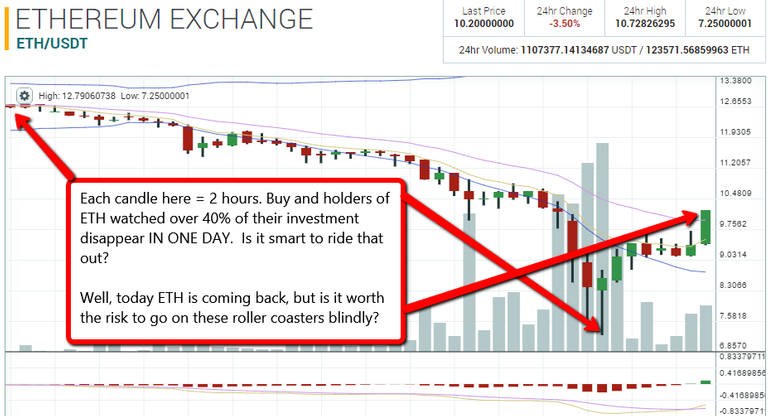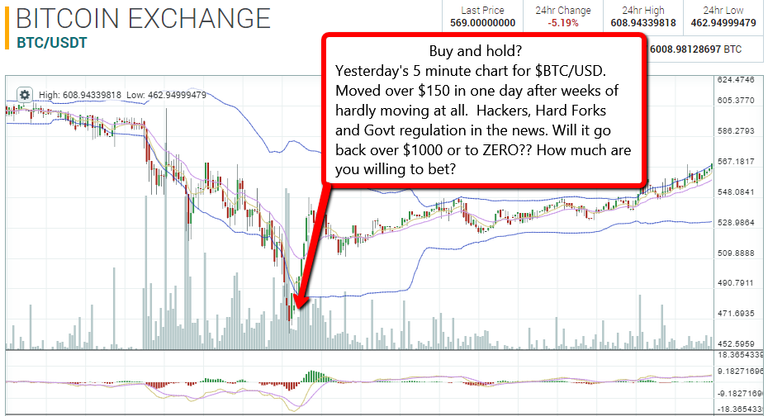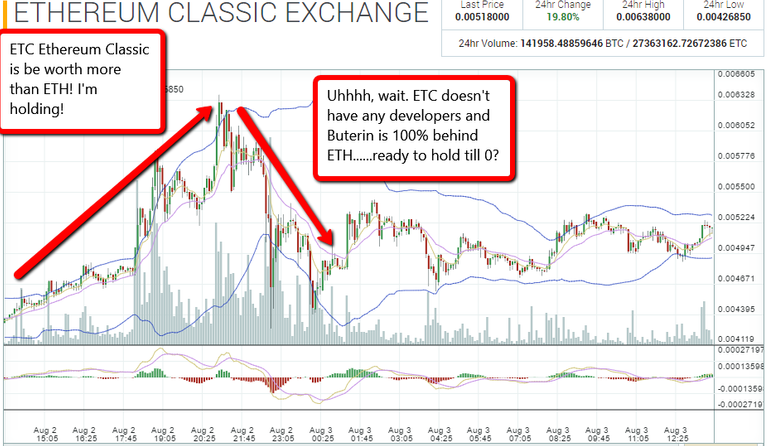
Wednesday, August 3, 2016 6:15 AM
In a world as volatile as cryptocurrency , old school "buy and hold" is the highest risk investment strategy of them all. Need proof?
- Bitcoin from approx $200 to $800 down to $450 yesterday
- Ethereum from 1 to $20 down to 7.00 back to 14 back to 7 yesterday
You may think your conviction to hold on during 100%+ moves makes you a "conservative" buy and hold investor. I think it makes you a serious gun-slinging gambler, and that's not how I want to invest my money.
A Better Way
The following rule is the #1 key to my success that has solved the stop-loss nightmare while I've made 100% return on my crypto trades in just 2 months:
Do not make a single trade without an exit plan.

It's now against my rules to trade (or invest) without an exit plan. But, I absolutely hate setting stop losses that I know will get hit right before the trade skyrockets (or plummets) to where I knew it was going to go.
To solve this dilemma, I've developed a number of successful strategies that allow me to trade in my comfort zone (translated: not just blindly setting stop losses because experts say you have to), while also protecting my financial position.
Some are simple and straightforward. Others are more complicated, but all of them require preparation and practice to implement successfully.
I'll cover many of my exit strategies in future posts - but we can start with this one :
Exit Strategy 1: The 100% Loss: Don't invest what you can't afford to lose 100%.
I determine how much money I'm prepared to lose on that particular trade, and that's exactly how much I invest. This means I have to be willing to accept a 100% loss. Why not 50%? Because when I tried 50%, I risked a lot more capital, and when the trade inevitably lost 50%, my brain came up with 10 reasons why I was stupid to get out at that point, convinced me to stay in the trade and I lost even more.
Pros of the 100% Loss strategy:
- Easy to implement
- Controls risk effectively
- Minimizes emotional decision making during volatility
- Minimizes returns because of smaller amounts invested
- Ties up capital on losing trades that may have better uses
- Can get complicated when you change your mind and want out

Everyone knows about stop-losses, but 90% of traders lose money.
I tried the "buy and hold" approach, and lost a bunch of money. I tried to enter every trade with specific stop losses set, and lost a bunch of money. I looked around and saw a bunch of other traders and investors doing the exact same things.
Time for new answers.
By developing multiple exit strategies, I've found I can trade aggressively and be profitable trading without taking huge losses. I even manage to hit a home run here and there.
CURRENT POSITIONS
100% Cash
for prior trades and posts https://cryptopatterns.wordpress.com/
for REAL TIME trades and updates https://twitter.com/Cryptopatterns
NOTE: NOTHING IN MY POSTS IS INTENDED TO BE TRADING ADVICE. Please do not base your trades on any information presented in the materials on this blog as it is for information and entertainment purposes only. You are 100% responsible for your own trading decisions.
You made some really good points here @lbtyf , but I do not agree on your positions. I love a bit of volatility.
However, you say your current position is Cash and that the BTC/USDT chart is BTC/USD, while in fact USDT is tether. So are you currently holding USDT or cash?
Hello @cryptotrends appreciate the feedback. I am a huge fan of volatility too - but some traders and investors just deal with it like sitting ducks and watch trades go miles from where they started without acting. As you'll see from some of my future posts, there's a better way to manage volatility without the need for fancy options, hedging or other professional level tools. As for my positions -- some is real cash and some Tether as I have multiple accounts at multiple exchanges. Stay in touch--sounds like you know your stuff.
Very entertaining article;)